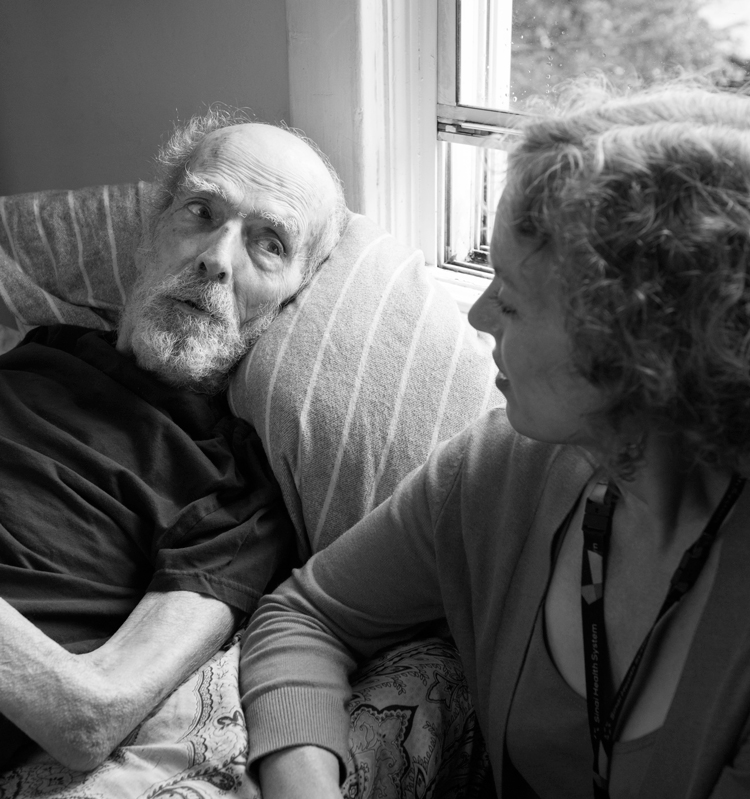
 Above: Ron and social worker Sabrina Gaon
Above: Ron and social worker Sabrina Gaon
Written By: Veronika Izabela Bryśkiewicz
Photos By: John Packman
The way Ron Marks remembers it: It was a bitter cold winter night in December 2012. He was in bed as usual — a chronic lower back injury had limited his ability to walk for more than a decade. Suddenly, there was a loud knock at the door. Some men stormed in, and told Ron he was being evicted from his home.
He was utterly dumbfounded as two policemen transferred him out of bed and onto a gurney. He was then taken to Mount Sinai Hospital, where he would end up staying for the next few months of his life.
Only much later, and thanks to tireless digging by Mount Sinai’s social workers, would it emerge that a trusted acquaintance had been stealing rent money from his bank account for an entire year, including $300 in overdraft, leaving Ron with nothing.
Months later, when the hospital had done everything it could for Ron and told him it was time for him to find a long-term residence, he was worried. He felt vulnerable going back into the community without any money, and worried about how he would fare with his injury.
When things seemed like they could not get worse for him, Ron met Sabrina Gaon, a social worker at Mount Sinai who was assigned to help him transition back into the community, which, at the time, was a scary thought for him.
“He wasn’t too happy about me at first,” Sabrina recalls, laughing.
By then, Ron had become quite acclimatized to the specialized ACE (Acute Care for Elders) Unit. The care team accommodated his back injury by placing a mattress on the floor. He was warm, safe, fed and free from anyone taking advantage of him. There was also a great social atmosphere. Young volunteers visited regularly, as did the hospital’s Rabbi Schulman and his wife, bringing by books and magazines.
So when Sabrina came by with a computer full of pictures of a group residence in Cabbagetown where he could live, the idea of moving yet again, at the age of 80, was daunting.
Because of the confidential nature of their role, Sinai Health System’s 48 social workers are rarely in the health-care spotlight. Yet, what they do is essential to maintaining the wellbeing and independence of patients, which in turn prevents hospital re-admissions.
“By the time a patient sees us, their health crisis is over and what ends up coming out is a lot of everything else,” explains Wendy Cameron, who is the Practice Lead for Social Work at Bridgepoint Active Healthcare, part of Sinai Health System. “The reality sets in.”
“As a social worker, you can go home feeling like you've made a real difference in people's lives.”
- Sabrina Gaon, Social Worker
“Sometimes, our work can start with counselling, which can then turn into getting the person connected with community resources based on their needs, such as housing, mental health services, Meals on Wheels, home care and many more,” says Patricia Wendy, a social worker at Circle of Care, a home care provider and part of Sinai Health System.
This past March, The Max and Larry Enkin Family Foundation gave a generous gift that will help provide much needed support for Sinai’s social workers, allowing them to connect more patients to resources in the community that can help keep them healthy after treatment ends.
“We know that patients are happiest back in their community,” says Sabrina, who today is the Manager of Interprofessional Allied Health at Mount Sinai. “When we can connect a patient to a community organization who can best serve them, we do. But sometimes we have to first help the patient before they can be discharged.”
Sabrina was determined to help Ron transition out of the hospital and into a place he could call home. She helped restart Ron’s lapsed government cheques — which was like detective work since Ron had no identifying documentation, and not even a birth certificate — so that he could begin to rebuild his savings. She also helped Ron file a police report against the acquaintance who had stolen from him, found a community volunteer who helped him file his taxes, persuaded him to move to the group residence she had found and ensured that Ron left the hospital with clothes, toiletries and first and last month’s rent covered. Today, the Hanson Fund, supported by the generosity of donor Mark Hanson, provides funding to cover these types of miscellaneous but critical needs for patients like Ron at the time of their discharge from the hospital.
Although it took time to gain Ron’s trust, in the end things worked out for the best.
“Maybe there are frustrations, maybe there is bureaucracy, but at the end of the day you give a voice to people who don’t always have a voice,” says Sabrina. “And you can go home feeling like you’ve made a real difference in people’s lives.”